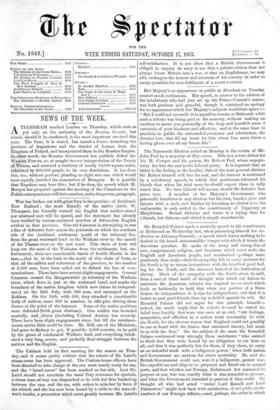War has broken out with great fury in the province
of Auckland, New Zealand ; the most, friendly of the native chiefs, W. Thompson, has formally warned the English that neither armed nor unarmed men will be spared, and the statement has already been verified by various scattered murders of defenceless English settlers in that province. General. Cameron is attempting to run a line of defensive forts across the peninsula on which the southern side of the Auckland settlement (south of the isthmus) lies, from the great westward bend iu the Waikato river to the mouth of the Thames river on the east coast. This chain of forts will keep out the mass of the Waikatos from the settlement, but, un- fortunately, there are considerable bands of hostile Maoris in the rear,—that is, in the bush to the north of this chain of forts, so that all the militia and volunteers of the province, to the number of 3,000 men, have been called out to defend the line of com- munications. There have been several slight engagements. General Cameron crossed the Mangatawhiri (a tributary of the Waikato river, which flows in just at the westward bend, and marks the boundary of the native kingdom which now claims its independ- ence) on the 12th July, with 380 men, and encamped on the Kohiroa. On the 14th, with 500, they attacked a considerable body of natives, some 300 in number, in rifle-pits, driving them thence at the point of the bayonet. Some of the native positions were defended with great obstinacy. One soldier was wounded mortally, and eleven (including Colonel Austen) less severely. There have been slight engagements since, but till the reinforce- ments arrive little could be done. Mr. Bell, one of the Ministers, had gone to Sydney to get, if possible, 2,000 recruits, to be paid by the grant of confiscated Waikato land, and everything betok- ened a very long, severe, and probably final struggle between the natives and the English.






























